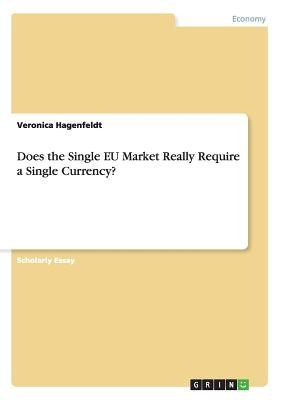
- We will send in 10–14 business days.
- Author: Veronica Hagenfeldt
- Publisher: GRIN Verlag
- Year: 2011
- Pages: 28
- ISBN-10: 364088082X
- ISBN-13: 9783640880829
- Format: 14.8 x 21 x 0.2 cm, softcover
- Language: English
- SAVE -10% with code: EXTRA
Does the Single EU Market Really Require a Single Currency? (e-book) (used book) | bookbook.eu
Reviews
Description
Scientific Essay from the year 2009 in the subject Business economics - Economic Policy, University of Edinburgh (School of Law), course: Economics and Policy of European Integration, language: English, abstract: Part I of this paper will illustrate that although the currency union signified the next significant step along the European integration ladder that was built already back in 1958, it must be recognised that the single market is not yet fully established in Europe. Hence the phrasing of the title question suggests the reading of whether or not the single currency is absolutely necessary for the completion of the single market. Part II is dedicated to the central aim of this paper, namely to assess to what extent the common currency furthers, or indeed counteracts, the achievement of the fundamental single market objective. While this essay goes to lengths in highlighting the desirability of the single currency and its many benefits that help further the achievement of the single market, it does however maintain that the currency union is not absolutely necessary for the establishment of the common market. Indeed, as has been noted, "it is possible to have a single market without a single currency". Furthermore, as will be shown in the forthcoming sections of Part II, there are even situations in which the single currency might be harmful to the single market and to the Union. Although the answer to the title question of whether a single currency is really required must necessarily be in the negative since the single market could potentially exist without the euro, this essay will conduct an extensive evaluation of the successes and failures of the euro and the Economic and Monetary Union (EMU) to further the single market objective in order to illustrate that the euro has nonetheless both enabled it to function much more efficiently and helped to bring European economic and political integration to previously unknown levels. In this sense the single market
EXTRA 10 % discount with code: EXTRA
The promotion ends in 8d.14:53:56
The discount code is valid when purchasing from 10 €. Discounts do not stack.
- Author: Veronica Hagenfeldt
- Publisher: GRIN Verlag
- Year: 2011
- Pages: 28
- ISBN-10: 364088082X
- ISBN-13: 9783640880829
- Format: 14.8 x 21 x 0.2 cm, softcover
- Language: English English
Scientific Essay from the year 2009 in the subject Business economics - Economic Policy, University of Edinburgh (School of Law), course: Economics and Policy of European Integration, language: English, abstract: Part I of this paper will illustrate that although the currency union signified the next significant step along the European integration ladder that was built already back in 1958, it must be recognised that the single market is not yet fully established in Europe. Hence the phrasing of the title question suggests the reading of whether or not the single currency is absolutely necessary for the completion of the single market. Part II is dedicated to the central aim of this paper, namely to assess to what extent the common currency furthers, or indeed counteracts, the achievement of the fundamental single market objective. While this essay goes to lengths in highlighting the desirability of the single currency and its many benefits that help further the achievement of the single market, it does however maintain that the currency union is not absolutely necessary for the establishment of the common market. Indeed, as has been noted, "it is possible to have a single market without a single currency". Furthermore, as will be shown in the forthcoming sections of Part II, there are even situations in which the single currency might be harmful to the single market and to the Union. Although the answer to the title question of whether a single currency is really required must necessarily be in the negative since the single market could potentially exist without the euro, this essay will conduct an extensive evaluation of the successes and failures of the euro and the Economic and Monetary Union (EMU) to further the single market objective in order to illustrate that the euro has nonetheless both enabled it to function much more efficiently and helped to bring European economic and political integration to previously unknown levels. In this sense the single market


Reviews